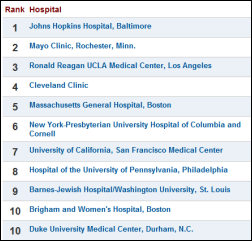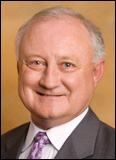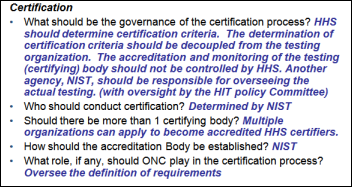"A valid concern..." Oh please. Everyone picks the software they like and the origin of that software is an afterthought.…
Monday Morning Update 7/20/09
From Leo: “Re: HHS. HHS is expanding its health information privacy enforcement team.” They’ve opened two new positions for Health Information Privacy Specialist.
From Hal Ebola: “Re: execs. Isn’t it interesting that in the midst of the biggest news about HIS in decades, the senior execs at many of the largest companies in the space have gotten the boot? In the past 18 months — McKesson, Siemens, Eclipsys, QuadraMed, etc.” A couple of folks e-mailed to say that new involuntary executive departures have occurred at McKesson and Eclipsys, but I don’t have specifics. Obviously all that potential HITECH money has raised the performance bar, maybe rightfully so now that there’s more at stake (so HITECH’s unintended consequences may have been vendor brass turnover). I only hope they don’t bring in a bunch of non-healthcare people who see patients as widgets since I’ve worked for HIT execs like that and I wanted to maim then regularly. Some of the most frustrated employees I’ve seen were clinical people who went to work for vendors — they had always thought the problem was lack of company knowledge, not lack of company interest in doing anything beyond the minimum required to sell systems.
From The PACS Designer: “Re: America’s Best Hospitals. U.S. News & World Report has released its annual survey of America’s Best Hospitals. TPD likes to focus on who is new in the listings and who has moved up in the rankings as it shows institutions that have made progress to better themselves in the eyes of physicians. Johns Hopkins remains #1, and rounding out the Top 5 are Mayo Clinic, Ronald Reagan UCLA Medical Center, The Cleveland Clinic, and Massachusetts General Hospital.” No surprises there except maybe UCLA. It would be interesting to see how the winners stack up in terms of cost (probably easy to do since the information is out there). You could do the same with the idiotic Most Wired awards, just out yet again, determining whether all of those highly wired hospitals have reduced cost or significantly improved outcomes in the last 3-5 years. Everybody involved with Most Wired stands to gain from the “buy it and they will come” illusion: HHN magazine, McKesson, CHIME, and resume-padding CIOs. Who knew that supporting your organization’s strategic goals through IT was a competitive sport?
From Nasty Parts: “Re: Sage. Exodus of talent from Sage continues. Dennis Mahoney, six-year vet, resigned last Friday. Dennis was most recently their top VP of sales.” Unverified.
From Looking for Answers: “Re: Banner Health. Isn’t it funny that if a vendor came in offering free software they wouldn’t be let in, but if they come in with expensive software and cut the price down, it all looks great?” Brilliant. In this change-resistant industry, maybe Medsphere should price OpenVista at $30 million and start the discounting at 50%, proceeding to 100% of the client insists. Like heavy software discounting by proprietary vendors, it would let providers think they are sharp negotiators.
From B.P. Fife: “Re: pretty darn good article.” Link. Washington Monthly’s Code Red: How software companies could screw up Obama’s health care reform. It’s yet another comparison between Midland Memorial’s OpenVista implementation vs. proprietary ones, this time the initially problematic Cerner one at Children’s Hospital of Pittsburgh, both of which I’ve reviewed amply here (in fact, I hate to say it, but I’m kind of tired about hearing about Midland Memorial since repeatability is a key concept and one implementation isn’t enough to judge Medsphere or, for that matter, Cerner). The article seems to imply that a sinister conspiracy exists among proprietary vendors, HIMSS, CCHIT, etc. to keep open source applications a big secret. They aren’t: CIOs, rightly or wrongly, are passing on a free system that they’re surely aware of, so you have to assume that (a) even though they may be overly risk averse, they aren’t stupid; (b) they aren’t universally easily manipulated; and (c) they would jump all over a free app if they had confidence in it and their hospital said OK. If Medsphere and companies like it can’t make their case and get traction, maybe vast collusion is just a convenient, far-fetched excuse for offering what the market doesn’t want, no different than a sign offering “free kittens”.
Related to that, from my poll on open source EMRs: 45% of respondents said CIOs should consider them because they’re just as good as proprietary systems; 20% said they’re not as good but should be considered because they’re cheaper; 13% said they should be avoided because they’re not good enough to be worth the potential cost savings; and 23% said they should be avoided because they’re unproven and risky. Obviously it’s not CIOs responding unless their responses differ from their actions.
Weird News Andy checks in: (a) a Lortab Lothario male nurse suggests to an addicted patient that he will provide pills in return for her favors. He signs out the pills for another patient, leaves them tucked in the first patient’s belongings, and, well, read The Rest of the Story. (b) Paramedic fired after telling a woman in pain to have drink and she dies the next day. Also from WNA: “Here is a link to a purposely confusing Republican chart that describes the Democrats’ socialized medicine plan.” Link (warning: PDF).
CHIME announces its new CIO certification program for healthcare CIOs who “want to enhance their professional stature.” CHCIO is much like CPHIMS: pass a test and you are in, but in CHIME’s case, you have to already have been a CIO for three years or more (so maybe the point is to unmask those poser CIOs who really weren’t qualified after all?) Obviously CHIME gets the same benefits that HIMSS does: certification generates revenue, makes the organization look like the de facto authority, and locks certificants into further revenue-generating renewals and conference attendance. It seems pointless to me – if you’ve got three years of CIO experience, I doubt slapping a credential nobody’s heard of after your name is going to impress anyone further (especially potential employers or peers). Certification often appeals to those lacking academic credentials, but there is no excuse for someone holding a six-figure CIO job not to have a master’s degree, given the plethora of convenient, cost-effective offerings widely available (I did it myself for one of my degrees while working two jobs and writing HIStalk, so I don’t buy the “I don’t have time” excuse). Still, for the insecure folks looking for a vanity credential that demonstrates what you already know instead of studying something new to earn a recognized degree or graduate certificate, you’ve got a new option. I’m thinking of launching my own certification, Designated In Primary Study of Healthcare Information Technology. I think the acronym would look real nice on a business card.
So, new poll to your right – what do you think of CHIME’s new credential? Don’t let me influence your answer.
Buddy Fain is promoted to VP/CIO of the University of Tennessee Medical Center. He’s a UT alum.
A Kaiser Permanente hospital is hit with a $187,500 fine this week for failing to protect the privacy of Octomom’s babies, adding to the $250K fine levied against it in May for failing to protect the mom’s records. Kaiser says 27 employees inappropriately reviewed their records, of which 16 quit, two were fired, and nine were disciplined. There’s a good lesson there: the punishment is just as harsh when the “celebrity” is at the end of their pitiful 15 minutes’ of fame.
Sun, on its way to being acquired by Oracle, pairs with healthcare data management vendor BridgeHead Software to offer an enterprise archiving system that offers a half-day installation and storage of multiple copies of the same data when needed. Sun liked BridgeHead because it’s big in the Meditech world. Did you ever notice that our own industry gives Meditech short shrift compared to companies like Epic and Cerner and yet big non-healthcare technology players instantly recognize the massive Meditech customer base as fertile ground for add-on technology, complementary applications, and consulting services? They’re like Rodney Dangerfield: they get no respect.
Chip at PCC blogs from this week’s CCHIT meetings. He’s got a lot of interesting observations (changing CCHIT membership, some friction between Mark Leavitt and one of its work groups, dropping the “version lockdown” certification requirement, and disagreement over whether an increase in applicants means CCHIT is doing a good job). Kudos to Bill Zurhellen, MD who said this directly to them: “If our goal is to certify to get ARRA payments, we’re doing the wrong thing. We should be focusing on improving health care.” Leavitt actually agreed and suggested that perhaps CCHIT’s mission statement should be changed to emphasize outcomes improvement instead of HIT adoption (not exactly an original thought since AMDIS and other groups have pressed CCHIT on that previously). I take that to mean that (a) all the CCHIT criticism and potential competition from other certification agencies has made CCHIT more responsive, or (b) it’s at least awakened a belated need to pretend to be more responsive.
Related: the Health IT Policy Committee recommends that CCHIT not be named the sole certifying agency, that CCHIT gives the appearance of conflict of interest, and that HHS should set the criteria instead of the certifying agencies themselves. Full details and PowerPoints from the committee’s Thursday meeting are here. That’s pretty big news that everybody seems to have missed. A new meaningful use matrix is also on that page, which Inga had already found and referenced in Friday’s post.
Since some folks (jokingly) accused me of making up the positive comments posted against Gregg Alexander’s interview with me, here’s a real one send from Mike Nelson, CIO of 25-hospital Universal Health Services, that he invited me to post: “I would also like to extend my appreciation for the work that you put into the writing and the site. And while it may sound like a plug (but it’s not) I like having sponsors here so I have another avenue to identify healthcare firms when I have a need for something, especially specialized consulting services.” I’ll vouch for that: in the past, Mike has copied me directly on inquiries he made to HIStalk sponsors for services he was about to buy. I appreciate both his eagerness to give HIStalk’s sponsors a chance to earn his business and his nice comments.
Florida’s state senate launches an investigation into the state’s blood banks following an Orlando Sentinel story that exposed lucrative contracts given by Florida’s Blood Centers, which takes in $100 million per year, to its board members. The chair of the Health Regulation Committee said he was “shocked” that FBC charges hospitals $310 per unit of blood. Most disturbing to me were e-mail comments from FBC’s $600K salary president, in which in one sentence she twice referred to the organization as “the company.”
Temple University Physicians signs up for Ingenix CareTracker Services for revenue cycle management and cost control in its radiology department, citing its 3% increase in collections and 16% reduction in payment times for the other seven departments using it.
As Inga mentioned, Nuance acquires Jott, a voice-to-text transcription application aimed at mobile users to create notes, use e-mail tools, and update application databases. While general cell phone users are its target audience, there certainly are healthcare possibilities there (nurses calling in vital signs to the EMR, maybe, or doing progress notes by cell phone).
Microsoft Health Users Group Exchange 2009 will be in Redmond on September 2-3. They have tracks for clinical informatics, IT professionals, and developers, with a presentation from Microsoft VP/CIO Tony Scott. Registration is here.
I’m making several changes that should help the HIStalk page load faster (for my nerd compadres, I had Apache upgaded, combined several WordPress widgets into one to reduce the number of MySQL calls, am having WordPress and all plugins upgraded, and am installing a caching application to render pages as static HTML instead of database-generated pages). Heavy server load is a nice problem to have, I admit.
Voalte needs field engineers, project managers, and clinical trainers, in case you are looking for a new gig. Other jobs: Epic ADT Consultants, Laboratory Requirements Analyst, Revenue Cycle Project Manager.
Cleveland Clinic chooses MediServe for referral tracking, authorizations, scheduling, documentation and the plan of care, integrating it with Epic.
UnitedHealth gets a $21.8 billion contract to manage DoD benefits, of which UnitedHealth will keep $1.5 billion for administrative services after paying providers. When it comes to “illions” in healthcare costs, “m” is so 1.0.
Bill Moyers lauds the choice of Regina Benjamin as surgeon general nominee, contrasting her hardscrabble upbringing and low-rent medical practice serving the less fortunate to the suits running the for-profit side of healthcare. Named: Cigna’s chair ($11 million in the last year), Aetna’s CEO ($17 million), and McKesson’s John Hammergren ($29.7 million). The list above was provided in a comment on the article. I wish I’d said this: “Here’s the difference. To Dr. Regina Benjamin, health care is a public service, helping people in need with grace and compassion. To Ed Hanway and his highly paid friends, it’s big business, a commodity to be sold to those who can afford it. And woe to anyone who gets between them and the profits they reap from sick people … As we reported last week, that behavior includes spending nearly a million and a half a day to make sure health care reform comes out their way. Over the years they’ve lavished millions on the politicians who are writing and voting on health care reform. Now it’s payback time.” From this hardcore fiscal conservative, amen, liberal brother Bill Moyers. If you want to make a million dollars a year without actually delivering patient care, then please choose another industry because healthcare can’t afford you, whether you’re a drug company czar or an overpaid hospital CEO (your results have kind of sucked anyway). Unfortunately, politicians gravitate to money like mosquitoes to a bug zapper, so people just as accomplished and dedicated as Regina Benjamin don’t carry much weight.
Stratus Technologies announces that PC Mall will sell its Avance high availability software.
iSoft gets a $17.4 million maintenance contract extension in Northern Ireland.
The Wall Street Journal says Internet companies are losers when it comes to investing, pointing out that they’re more like unexciting utilities. “Microsoft has spent billions on Internet strategy without a dime of profit. And even Google can’t seem to find any other business model other than the one they stumbled into when they bought Applied Semantics in 2001 that had a little piece of software called AdSense. And the new guys: Twitter and Facebook are still scrambling for profits despite blistering usage growth.”
GE announces Q2 numbers: revenue down 17%, EPS $0.26 vs. $0.54, much of that due to problems in its financial business (I hate to brag, but I said Jeff Immelt’s haughty dismissal of GE Capital’s problems as trivial early in the economic meltdown was BS and it was). GE Healthcare had drops of 12% in revenue and 21% in profit.
Private equity firm Warburg Pincus invests $300 million to form RegionalCare Hospital Partners, which will invest in non-urban hospitals. There’s a lot of talk in the announcement about meeting community needs and service to others, which sounds strange coming from a PE firm.
Another hospital computer breach: UCSD sends letters 30,000 patient letters after finding out about hackers hacking.
Informatics Corporation of America wins its second consecutive Future 50 award from the Nashville Area Chamber of Commerce in recognition of its growth.
Marietta Memorial Hospital (OH) “insources” its IT department to CareTech Solutions, keeping its employees but bringing in a CareTech director.
Red Hat will replace CIT Group on the S&P 500.







Like TPD, I’m interested in who’s new on the list. And the “biggest movers”, both up and down. So, who are they??
Good to see that CCHIT’s conflict of interest is finally being acknowledged by those in power. I sure hope that the marginalization of CCHIT continues…
Al
Why is it a surprise UCLA is in the top 5? They’ve been in the top 5 for years, top 3 for at least 2 years now…
“Certification often appeals to those lacking academic credentials…Still, for the insecure folks looking for a vanity credential that demonstrates what you already know instead of studying something new to earn a recognized degree or graduate certificate, you’ve got a new option.” I’m thinking of launching my own certification, Designated In Primary Study of Healthcare Information Technology. I think the acronym would look real nice on a business card…
Look at who is on the credentialing commitee: two from the same organization working two different sub-groups writing the questions, etc. This is ridiculous. Have a close look and you’ll see what I mean.
RE: Organizational Chart of the House Democrats’ Health Plan. What an exquisite cubist rendition of mapping the journey toward “Meaningful Use” for the adoption of anything healthcare.
It appears that all roads lead to the IRS. How wonderful is that for funding?
RE: Certification, Designated In Primary Study of Healthcare Information Technology.
I propose the Office of Health Safety in Healthcare Information Technology would adequately handle appropriate certification. OHSHIT would be the certifying agency for DIPSHIT.
RE: Weird News Andy. House Democrats Health Plan.
http://docs.house.gov/gopleader/House-Democrats-Health-Plan.pdf
Bravo the artist! This is the most inspiring rendition of cubism art since the Dada movement. Just take the surrealist path down any healthcare reform road and you eyes will lead you to the IRS. How comforting to know that the secret message in healthcare reform lies in individual tax returns.
It is all a matter of “pattern recognition” as in surgical pathology.
The “CHCIO Certification” is a certainly a great candidate for the DIPSHIT acronmym…
As an additional thought. There’s one of the “double team” member organizations mentoned earlier who’s been a “deputy cio” for a few months (total career as a “cio”) and on three commitees of the CHCIO group…I thought this required three years to be certified and what the helll is he doing on the commitee?
CHIME is a CLUB…
“Microsoft Health Users Group Exchange”
Ya know this could give rise to the acronym “MicroHUGE”. I rather like that.
I couldn’t resist commenting.
It appears that CCHIT is trying to monopolise EHR/EMR Certifications and they have not even rationalised with definition of ‘meaningful use’. Seems ridiculous!
As a former CHIME member back in the early 90s, I have witnessed their growth. CHIME has been around for about 15-17 years now and it is hard for me to figure out what they have accomplished other than being a place where the CIOs are placed on pedestals, treated to golf parties and spas, networking parties, and short vacations to nice resorts paid by the sponsor suppliers with travel paid by their health care employers. The comment above of CHIME being a “club” certainly is true. With this special treatment, CHIME inflates the ego of struggling CIOs who spend much of their time looking for their next job or promotion rather than delivering a result, and in particular those who are nothing more than glorified IT Directors. The CHCIO? Talk about a false sense of achieving or identifying success!
CIGNA is in the business of providing “health insurance” not health care. If insurance companies are inherently evil then why do they exist at all? They have been around since 1792 so this isn’t a company that was created as a knee jerk reaction to some fiscal crisis.
From my fiscally conservative viewpoint Ed Hanway is running an organization that supplies a product that many customers apparently find attractive enough to purchase. He provides leadership for a business that employs 33,000 people worldwide. Yes, he laid off 3% of his workforce in a global recession, but even still the company provides about 1.2 billion in payroll every year which goes to your dry cleaners, restaurants, public schools, private schools, physicians and the biggest benefactors – tax collectors at the federal, state and local levels.
I agree that there is plenty of reason to applaud Regina Benjamin. She is by all accounts that rare exception of a person who continues to excel in the face of seemingly unending challenges. Celebrate her and I will gladly join in.
Is the best way of celebrating her accomplishments really to impose Bill Moyer’s ideas of fair compensation on business leaders?
Re: Mr. H’s comment: “Some of the most frustrated employees I’ve seen were clinical people who went to work for vendors — they had always thought the problem was lack of company knowledge, not lack of company interest in doing anything beyond the minimum required to sell systems.” is spot on from my experience.
Sad but true, the epiphany that these former clinicians experience can be painful to be debilitating. Earlier in my career as a manager at a HIT vendor, I would automatically search out the clinicians, only to watch them spiral into frustration, depression and anger. I am now much more discerning and cautious in my hiring choices.
Winston Z.
To answer your question, the improvement over 2008 among the top hospitals reveals that Barnes Jewish Hospital, St. Louis moved from 12th to 9th, Stanford Hospital and Clinic, from 16th to 15th, and NYU Medical Center is new to the list at 17th position. Also, taking a look by a specialty, TPD went to Heart and Heart Surgery Hospitals to find who is new to the Top 50 for that specialty, and congratulations go to: Ohio State University Hospital-Columbus, Abbott Northwestern Hospital-Minneapolis, Union Memorial Hospital-Baltimore, Greenville Memorial Hospital-Greenville,SC, Virginia Commonwealth University Health System-Richmond, Loyola University Hospital-Maywood,IL, Harper University Hospital-Detroit, Newark Beth Israel Medical Center, Ochsner Medical Center-New Orleans, Inova Fairfax Hospital-Falls Church,VA, and Henry Ford Hospital-Detroit. As far as those moving down, most are minor drops, and since new physicians are queried each year, TPD won’t hold those moving down in a negative light by listing them here!
Does anyone know the reason why Linda Kloss, CEO of AHIMA, is stepping down after 15 years? AHIMA was one of three founding organizations of CCHIT. Does this have anything to do with the IRS looking at (and still reviewing) HIMSS’ tax records and discovering the “loans” between CCHIT and HIMSS? Is H. Stephen Lieber (CEO of HIMSS) and Mark Leavitt (Chair of CCHIT) next?
http://www.healthcareitnews.com/news/ceo-ahima-step-down-after-15-years
“A Kaiser Permanente hospital is hit with a $187,500.. ” for looking at octamom’s PHI.
This really pissed me off when I read this- for one, this patient is selling her story all over the place (I guess Kaiser peepers, in part, were infringing on her right to profit from the details) even though I know it does not excuse the misbehavior. And two, this fine money comes straight out of patient care.
Re: “Some of the most frustrated employees I’ve seen were clinical people who went to work for vendors — they had always thought the problem was lack of company knowledge, not lack of company interest in doing anything beyond the minimum required to sell systems”.
I cannot agree more the first part of this comment although the ones I’ve worked also did their best to do the bare minimum required to get the biggest bang for their buck. At the end of the day, profit is what matters most, not improving patient care. It frustrates me to no end when I see vendors try and push that marketing bull.
MK in CA is right in saying that we do become frustrated and angry and it does become debilitating. Over my 13 years in HIT as both a clinician and a software engineer, the enivonment hasn’t changed. And I actually do believe that vendors would prefer not to have technical clinicians work with them. Could it be that we’re a threat?
BlueDog-
Do you have a URL about the IRS investigation of CCHIT? Finally… thanks for the heads up! Maybe Tim and Inga can check into this too.
Al
Dr. Borges, I do not have the IRS information for the investigations into HIMSS and CCHIT. I read in one of the blogs that there was an IRS whistleblower complaint(s) filed against HIMSS and CCHIT. I also read the article by Robert O’Harrow Jr in the Washington Post, and wonder if he received this information from the whistleblower complaint(s). I wish I knew more. I am sure HIMSS, CCHIT and AHIMA have their hands full trying to explain to the IRS the “loans” among the three orgs and how they all shared a piece of the $7.5 million pie. What a nice return on a $50K investment…
The marginalization of CCHIT by the HIT policy committee definitely seems to be something people have ignored. Thanks for highlighting it. However, expect CCHIT to come back and try to say that their thorough certification somehow improves EHR programs far beyond what ARRA actually does. Their fight isn’t over, but I believe now they will lose the battle.
The IRS is definitely investigating loans made amongst AHIMA, HIMSS and CCHIT. I think we’ll be seeing some more resignations soon.
Is Linda Kloss at AHIMA the latest victim in the CCHIT scandal?